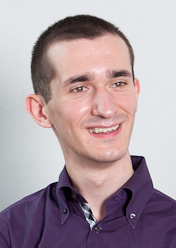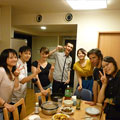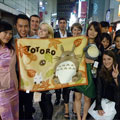Alexander Djourdjin |
Bulgaria, Sofia |
School of Political Science and Economics Exchange student from the University of Sheffield |
Meiji University and Tokyo

ast. This is one of the adjectives that comes to my mind when I think of this city. Although, it might not in fact truthfully convey just how big it is. Different is also a very good word to describe it. Different from all other cities I have visited before; different from Japan; different from within itself. It is enthralling. It is mesmerising. It is difficult to understand most of the time, but truly enriching once you actually do manage to. It is fun. It is full of life. It is bright. It is beautiful. It is unique. It is Tokyo.
I love big cities. I love the fact that they are full of people; people that create energy; energy that makes life go fast, energy that creates an atmosphere that is always changing, that is always different, that is always interesting, that never ceases to surprise you. Tokyo is just that – not only does it have its own heartbeat, but you could say it has several, because every part of Tokyo is different from all others, every district has its own vibe, its own energy that is unique and could not be found anywhere else in Tokyo, and most probably anywhere else in Japan. Meiji University is in the centre of this city. The locations of the campuses allow you to immerse yourself completely in Tokyo and really experience it firsthand. The main campus – Surugadai - for example is located in the largest second-hand book area within the capital, with the streets around the university overflowing with books – both classical and modern Japanese literature. Yet, it is also located next to the Imperial Palace and the Marunouchi district, which are all about politics and business; next to Kanda, which is famous for its temples; next to Akihabara, which is completely and utterly different from every other place in Tokyo, with its electronics, manga culture, otaku and maid cafes; next to the Tokyo Dome, which is all about baseball. Yet, somehow, all these seemingly incompatible places fit together perfectly and offer a glance at life in Tokyo as it is – diverse and fascinating.
On the other hand, the Izumi campus and the university's accommodation for foreign students are located in Meidaimae, which is entirely different. Although Meidaimae is more laid-back, small, and quiet, it is only ten minutes away from both Shinjuku and Shibuya and less than twenty minutes away from Harajuku. These three districts – all famous for their fashion, culture and music – make for the core of young culture in Tokyo. Shinjuku with its Kabukicho, Shibuya with its 109 (Ichi-maru-kyuu) and bars and clubs, and Harajuku with its cosplay are the best examples of what goes on within the young generation of Japan. Living so close to these areas allows me and all other exchange students living here to experience that on a daily basis. And this is an incredible opportunity; as Tokyo is a city where people would travel two hours by train one way to work. We live ten minutes away from the most vibrant districts in Tokyo. We study fifteen minutes away from the places where the politics and economy of Japan are being decided on a daily basis, and that is amazing.
Having said that, from my point of view, the exchange program in Meiji University has contributed immensely to my exploring of this metropolis. The Japanese language classes require a lot of individual study but also allow the students enough free time to be able to apply the knowledge acquired firsthand and in my day to day life, which has been made even easier by the central location of the university. The topics covered in the classes could easily be conveyed into the student's daily life and then further expanded by simply communicating with Japanese people. Another point that I find great is that the university, not being an isolated closed-door student-only campus, but being a campus integrated within the city, allows us foreign students the possibility to communicate not only with Japanese students, but also with people from all strata of society. I believe this gives us a far better insight into the culture and habits of Japanese people. Furthermore, there is a wide choice of regular classes available, depending on the major you are studying that adds to the learning experience even more than the Japanese language classes themselves. This is because the regular classes are not designed for foreigners, but for regular Japanese students, therefore following them is a lot more challenging and as a consequence requires more focus and further individual study. I, for example, am in the Politics department and the lectures have been very interesting, as they offer a Japanese point of view into world politics that is very different from the one I have heard back in my home university in England. Also, thanks to the lectures here I quickly expanded my terminology in the field which has proven extremely useful when reading newspapers and reading books on politics.
This is my first time in Tokyo, first time in Japan, and first time in Asia. As such, every day has been a discovery of something new – be it a new place, be it a tradition, be it a habit that I had not known before. It is exactly this that has probably been the most exciting, the most enthralling point of my year abroad. Living in a place that offers something new every day, that constantly transforms itself, that constantly reinvents itself, makes itself better, has been rewarding in so many different ways. I have to say that the difference between reading about Japan and Tokyo in particular and actually experiencing it personally is enormous. It is probably impossible to understand Tokyo from just reading about it. Thus my life here, the people I have met, the culture I have experienced, the food, the extraordinary food I have literally indulged in, the places I have seen and visited, have all made this the best year of my life. What I have come to understand is that Tokyo is by no means truly representative of Japan, probably not at all so. However, it is a place that incorporates so much of what Japan has to offer and combines it with what Japan has taken from the world and with what the world has given Japan, and through that fusion Tokyo gives a very unique and remarkable insight into what Japan is. This is, in my opinion, what makes Tokyo worth exploring. This is also why I would recommend Meiji University – not only is it a top-ranking university that offers excellence in education, it is also in the centre of this dynamic and modern city; and as the city transforms, the university transforms as well, integrating newer aspects of life that are then transferred to its students. Hence the motto of the university – 'Empowering the individual'.
| Previous | Top | Next |

















